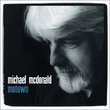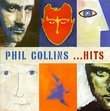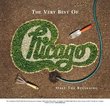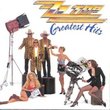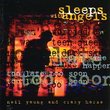| All Artists: Jr Walker & All Stars Title: Ultimate Collection Members Wishing: 10 Total Copies: 0 Label: Motown Original Release Date: 10/7/1997 Release Date: 10/7/1997 Genres: Pop, R&B, Rock Styles: Oldies, Motown, Soul Number of Discs: 1 SwapaCD Credits: 1 UPC: 731453082823 |
Search - Jr Walker & All Stars :: Ultimate Collection
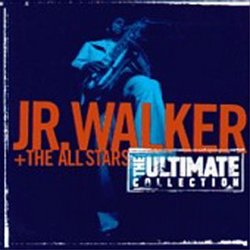 | Jr Walker & All Stars Ultimate Collection Genres: Pop, R&B, Rock
Saxophonist Jr. Walker was the most gutbucket of Motown's consistent '60s hit makers. Even when trying his hardest to conform to label formulas ("What Does It Take [To Win Your Love]," "Gotta Hold On to This Feeling"), he ... more » |
Larger Image |
CD DetailsSynopsis
Amazon.com Saxophonist Jr. Walker was the most gutbucket of Motown's consistent '60s hit makers. Even when trying his hardest to conform to label formulas ("What Does It Take [To Win Your Love]," "Gotta Hold On to This Feeling"), he sounded like he'd be just as much at home in the backroom of a barbecue joint. When pursuing his muse in even more minimalist form ("Shotgun," "[I'm a] Road Runner," the smoky "Cleo's Mood"), he sounded like the owner of the place. --Rickey Wright Similarly Requested CDs
|
CD ReviewsEssential recording. Pure sax, soul, blues and all fun! Shawn Chittle | New York, NY USA | 12/26/2000 (5 out of 5 stars) "Junior Walker is a Motown star who recorded his music under his own name (which actually was Autrey De Walt). The "All Stars" name came when at a show a fan screamed "These guys are All Stars!" He worked and died in Battle Creek, MI (where I lived for 3 years) in 1995. (Trivia: he's buried very close to the Kellogg family.) This album faithfully recalls his best work, of which my favorites are "Pucker Up Buttercup" (if you can't dance to this you are dead), "Way Back Home" (a powerful walk down memory lane, the lyrics conjer vivid images), "These Eyes", "Roadrunner", "Shake and Fingerpop", "Home Cookin' " "Hip City" "Do You See My Love" and of course, his most popular, "Shotgun." He also recorded some Motown standards ("Come See About Me", "How Sweet It Is To Be Loved By You") which he made his own with his approach to the song. His sax work is genre defining, highly copied today, and puts him amongst the best of the best of all time. His voice is scratchy, soulful, and his hootin' and hollerin' are what make him so soulful. This record will get you movin', make you happy, and put a smile on your face. Junior Walker & The All Stars probably belongs best in your car stereo crusin' down the highway on a summer day. Junior Walker -- you are sadly missed." Chuck Berry Was Psychic Mike King | Taunton, MA United States | 10/28/2002 (5 out of 5 stars) ""I took my loved one over 'cross the tracks So she could hear my man a-wailin' sax. I must admit they have a rockin' band. Man, they was blowin' like a hurricane. That's why I go for that rock and roll music."Chuck Berry wrote those lyrics in 1957, but he sounds like he's talking about the 60's Motown group Junior Walker and the All Stars. The opening blast of "Shotgun" literally starts things off with a bang. The song is a rock and roll classic, featuring vocals alternating with the saxophone, which became the trademark sound of Junior Walker. That sound works to best effect on the pop standard "What Does It Take (To Win Your Love)." "Satan's Blues" is a scorching blues instrumental, while "Cleo's Mood" and "Cleo's Back" are instrumentals that combine both blues and jazz elements. "Do The Boomerang" and "Twist Lackawanna" are dance songs in the tradition of Chubby Checker. "Shake And Fingerpop" is a rhythm and blues tune in which the singer urges his girl to "Kick off your shoes baby, and get in the groove, cause when you hear the music your feet have got to move." Junior Walker's music has that affect on all his listeners. The 1972 song "Walk In The Night" has some disco elements, but with a lot of soul, courtesy of Junior Walker's sax. His version of Marvin Gaye's "How Sweet It Is (To Be Loved By You)" sounds like it was recorded at an after hours nightclub, as does "Last Call," which ends this collection on a strong note. As evidenced on this compilation, Junior Walker and the All Stars crossed and combined many genres of music. If I had to categorize their music, I would call it GREAT!" They Didn't Just Jump Off The Grooves - They Exploded Them BluesDuke | Las Vegas, Nevada | 11/14/2002 (5 out of 5 stars) "Berry Gordy had only one order when Harvey Fuqua included Jr. Walker and the All Stars with the package when folding his Harvey label into the Motown stable around 1964: "Leave him alone. Let Walker cut the way he is." And for the most part, that is precisely what Junior and the boys did. Assigned to Motown's new Soul label (set up to compete with the embryonic but rising hard Southern soul), they didn't just jump off the grooves, they exploded them. And though Walker's unmistakeable tenor saxophone style - that deep-breathing, high-wailing sound where the rural backroads of his roots meet the backstreets of his working life - is the no-questions-asked calling card, you'd be very hard pressed to suggest Walker would have worked as effectively had he been backed by a different band. The All Stars' aged-in-sweat feel is precisely the right support system for that incandescent sax.Anyone who planned on going to his grave mistaking Walker for a two-trick pony on the basis of the gutbucket classic "Shotgun" or the urbane soul of "What Does It Take (To Win Your Love)," the two hits with which he remains most identified, is going to have to change his plans hearing this set, the elemental anthology Walker has long deserved. Just begin with "Shake and Fingerpop," the second track. From the thwapping drum kickoff and that insane-in-the-brain ludicrous-high C saxophone squeal to the heartpunching guitar-bass riff, this makes "Shotgun" resemble a dirge. (The heavy mental meatheads and hip-hop slops only wish they had something this dangerous to crank.) Aside from "Cleo's Mood" (and its surprisingly effective answer track, "Cleo's Back"), you have "Tune Up" (probably the single least inhibited single ever to spring from the 1960s Motown stable, if you don't count the Contours' earlier "Shake Sherrie") "Satan's Blues," "Last Call," even "Pucker Up, Buttercup" proving these guys were as much the sons of the blues as anything else. They even got Motown's most stylised writer-production team to loosen up: Holland-Dozier-Holland got in on the fun by writing and producing for them "(I'm A) Road Runner," and it didn't exactly leave them scarred for life."What Does It Take (To Win Your Love)," the best-selling single of Walker's career, wasn't as offbeat a turn as might have been thought considering Walker's image until that point. (Motown chronicler Nelson George pretty much nailed it when he described "Shotgun" as having "the kick of a bull and the greasy feel of a pig's feet dinner.") Walker's saxophone style was actually deep enough to knit with the sauteed polish of the fabled Funk Brothers house musicians. And they put depth to spare into composer/producer Johnny Bristol's slightly stylised soul balladry. They got some decent mileage out of the mode, not to mention (just listen carefully to "Do You See My Love For You Growing," "Take Me, Girl, I'm Ready," and the beautifully moody "Walk In The Night") opening the door toward disco (though you can't blame Junior for that genre's worst excesses of metronomic banality). But the pair also had enough anchorage to take a kind of subversive liberty with Motown's underpinnings, and it resulted in the most jarringly affecting record of Walker's career in 1972. Getting sociopolitically relevant (as began to happen with the label's music in 1967-68) was one thing, but it was something else again to bump against the history Motown's very existence sought (and usually successfully) to transcend. Bump against, take on, and all but wave it in its own face with a shocking affirmation is precisely what Walker did with "Way Back Home" (which Bristol co-wrote with Gladys Knight, whose own "Midnight Train To Georgia" would suggest a similar tortuous homecoming from another vantage). In three minutes of bristling music with gospel overtones and the most passionate vocal Walker ever cut in his life (not to mention perhaps the most controlled heat he ever breathed through his sax), he stared down the cold reality of his Southern root at the outset, then slapped it right to one side to remember what was simple, affecting, enduring ("Have ya ever been swimmin' in a muddy creek/with nothin' on your body from your head to your feet/like way back home?"), and unstolen by even the worst of the old South no matter where his life had since taken him. This may have been too raw to let "Way Back Home" become a huge hit even in 1971-72, but it has dated far, far less than most topical protest music, thanks to the shameless soulfulness applied with no small irony by Motown's own Mr. Life Of The Party.And you'll want this CD's selection because they were mastered from the original singles; Motown was only too notorious for cutting just-so-slightly-different versions for its albums, and Walker especially should be heard even now as he intended it to be heard on the radio or in the jukeboxes: undiluted and untaxed. (Ideally, he of all the Motowners should be represented by a live album, but the three released on him back in the day were so haphazardly recorded, and so drastically mixed the guts right out of the man's music, that they remain unlistenable.) He recorded sparingly at best in the years since his Motown hitmaking run dried up (though it's long been a cliche that he put the whomp into Foreigner's "Urgent"), and it might seem a waste, but (as Allan Slutsky's booklet notes illustrate) Walker didn't exactly live for the recording studio in the first place. It showed when, like most Motowners of the time, was compelled to take a crack at a labelmate's hit (really: we could live quite nicely without his versions of "Come See About Me," "Money," and "How Sweet It Is"), but even playing his own music he played like he was running fifteen minutes late getting to the next roadhouse and the next sweaty gig. Almost forty years after "Cleo's Mood" started it all, Walker's music still sounds that way - lucky us."
|

 Track Listings (25) - Disc #1
Track Listings (25) - Disc #1